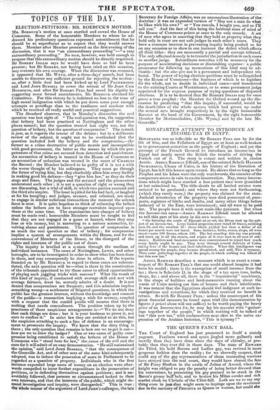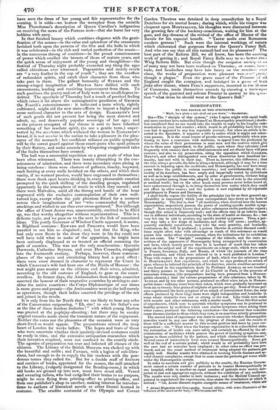THE QUEEN'S FANCY BALL.
THE Court of England has just presented to itself a stately pageant. Feathers waved and spurs jingled more gallantly and merrily than they have done since the days of chivalry, or pro- bably than they ever did in those days. The state of EDWARD the Third, his bold Barons and Ladies gay, was revived in more gorgeous fashion than the reality ; for we shrewdly suspect, that could any of the gay representatives of those marauding warriors have strayed into the real court, they would have shared the fate of Sir Percy Shafton in the castle of Julian of Avenel, where the knight was obliged to pay the penalty of being better dressed than his entertainer, by presenting his gay poniard to be stuck in the Baron's greasy buff belt, and to bestow his Milan corslet and rich. scarlet cloak on Christie of the Clint-hill. Loth are we.to say any thing even in jeatahat might seem to Impinge upon the reverence due to the memory of NiILIPPA as Queen or woman, but could she
have seen the dress of her young and fair representative for the evening, it is odds—we borrow the metaphor from the amiable Miss Plumdamas's description of Queen Caroline's indignation on receiving the news of the Porteus mob—that she burst her very bobbins with envy. In that finished luxury which combines elegance with the grati- fication of the senses—in the value and splendour of the ornaments lavished both upon the persons of the fete and the balls in which it was celebrated—in the rich and varied perfection of the music— in the numerous throng of courtiers—in the proud consciousness of power which swelled the breasts of those of mature years, and the quick sense of enjoyment of the young and thoughtless—the festival of Thursday night probably exceeded any thing the ages called chivalrous ever witnessed. Pageantries and stately revels are "a very feather in the cap of youth " ; they are the overflow of redundant spirits, and catch their character from those who take part in them. The gallant humanity of SYDNEY and the strong-winged imagination of MILTON have dallied with such amusements, lending and receiving improvement from them. To such pastimes the poetry and art of Italy were in no small degree in- debted. The spectacle of Thursday had a touch of poetical feeling which raises it far above the unimaginative gaudiness of GEORGE the Fourth's entertainments : it indicated a taste which, rightly cultivated, might aid the new state-efforts to import a higher and more national character to the arts of design. ELIZABETH'S love of such gauds did not prevent her being the most shrewd and adroit, ay, and deservedly popular sovereign of her age ; and as the present occupant of her throne is said to have inherited something of her resolute spirit, (to use a gentle term,) unper- verted by the accidents which withered the woman in ELIZABETH'S breast, it is not unwise in the nation to take a pleasure in the plea- sures of the monarch : her confident reliance on public sympathy will be the surest guard against those court-pests who spoil princes by their flattery, and make amends by whispering exaggerated tales of the faults themselves have created.
The ball was a successful repetition on a great scale of what has been often witnessed. There was beauty triumphing in the con- sciousness of admiration, and there were secondary stars pining at being outshone : there were clusters of gallants, touchy, wayward, each fretting at every smile lavished on the others, and which their vanity, if no warmer passion, would have engrossed to themselves ; there were frank open hearts drinking in every pleasurable emotion prompted by the quick shifting of the dazzling groups, regulated apparently by the atmosphere of music in which they moved ; and there were Malvolios, amid all the throng and bustle of the hour engrossed with the exclusive contemplation of their own well- turned legs, except when the pale phantom flitted for a moment across their imaginations of her "who commended thy yellow stockings and wished to see thee ever cross-gartered." Nor although the office of Court Jester was, unaccountably, omitted to be filled up, was that worthy altogether without representatives. This is a delicate topic, and we pass on to the next in the link of associated ideas. The portly Governor of Windsor Castle appeared, it seems, in Highland costume : EDWARD and Pmerepa would have been puzzled to see him so disguised ; and, but that the King, who had only seen Scots in the dress they wore in his day could not well have told what to make of the apparition, he might have been seriously displeased at so trusted an official assuming the garb of enemies. This was not the only anachronism : Quentin Durwards, Catherine Seytons, and even Don Cossacks, straggled into the fourteenth century. Perhaps, however, those common- places of the opera and circulating library had a good effect : there were enow dressed in character to represent the Court in which CHAUCER'S wife had been one of the Maids of Honour : the rest might pass muster as the citizens and their wives, admitted, according to the old customs of England, to gaze at the court- revellers. In former days, the Ambassadors from foreign countries asserted the honour of their respective countries by striving to out- shine the native courtiers : the Corps Diplomatique of our times is more grave and prosaic—the Ambassadors went to the ball merely as spectators, though their ladies asserted the privilege of the sex and joined in the revels.
It is only from the far North that we are likely to hear any echo of the Cameronian outpouring, "Eh, sirs ! to see his father's son at the like of these fearless fooleries ! " with which young Morton was greeted at the popinjay-shooting : but there may be sundry oriignal remarks made about the transient nature of the enjoyment. Neither the cares nor the pleasures of the occasion were so very short-lived as would appear. The preparations stirred the deep heart of London for weeks before. The hopes and fears of those who were uncertain whether their quaintly-devised costumes could be ready in time, and the extensive antiquarian researches which their invention required, were not confined to the courtly circle. The agonies of preparation ran over and infected all classes of the citizens. The Library of the British Museum was choked up with the beautiful and noble; and PANIZZI, with a legion of sub-libra- rians, had enough to do to supply the fair students with the pon- derous tomes they called for. But for a double staff of fetchers and carriers of books, appointed for the season, the mill attached to the Library, (vulgarly designated the Reading-room,) in which old books are ground up into new, must have stood still. Vexed and sweating tailors, who had cudgelled their brains to no purpose, might be seen flying from printing-office to printing-office, and eoni one publisher's shop to another, making interest for introduc- tions to authors of historical novels or other literati learned in costume. The erudite costumist of the Olympic and Covent Garden Theatres was detained in deep consultation by a Royal Dutchess for six mortal hours; during which, while his tongue was eloquent upon MONTFAUCON, his thoughts were distracted between the growing fare of the hackney-coachman, waiting for him at the gate, and day-dreams of the revival of the office of Master of the Revels for his especial benefit. "Taut molls erat Romanam condere gentem 1" Such were the internal workings of nature which elaborated that gorgeous flower the Queen's Fancy BalL And who can say that all this turmoil had not its pleasures? The best part of the Reform Bill, we all know, has been the elciting work of getting it ; and Royal Fancy Balls may be ti.' better thau Whig Reform Bills. But even though the sanguine ainicip,ti 'us of many may not have been realized on Tbursda■, or entiut, tass. • tude, and headaches may have lain heavy on the reveller, ever since, the weeks of preparation were pleasant wee preity though a plague." Even the grave court of the Primate "f all England caught the contagion, and indulged in a game of jinks after dinner, where PEEL'S supporters, muzzled in tile 'louse of Commons, made themselves amends by cheering a burlesque speech of the guarded and solemn Premier in answer to the +wa- llop "what dress he should wear at the Queen's Ball."



























 Previous page
Previous page